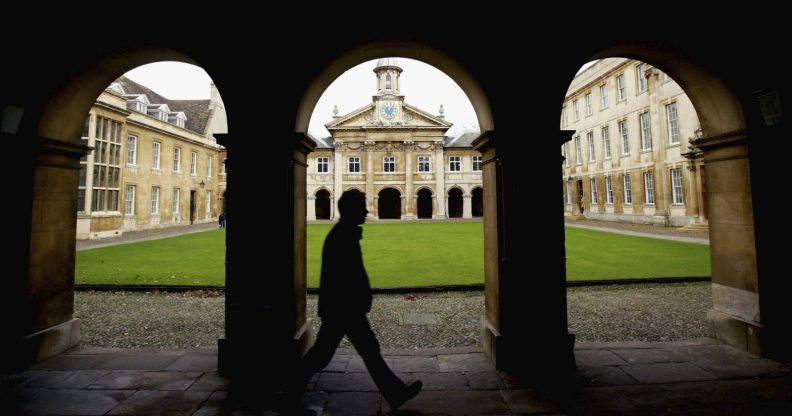Universities to be stripped of powers to prevent anti-LGBT speakers in ‘free speech’ push

Cambridge University (Graeme Robertson/Getty Images)
The UK government is pressing forward with threats to impose sanctions on universities that block controversial speakers from addressing students.
Last year, former universities minister Jo Johnson announced changes to curb the rights of academic institutions to prevent speakers with extreme views.
Johnson threatened to hit universities with fines and other sanctions if they prevent events from going ahead due to controversial speakers, specifically citing controversies over speakers with homophobic and transphobic views.
His replacement as universities minister, Sam Gyimah, is on Thursday set to push forward with the plan, which will give newly-created watchdog the Office for Students powers to impose sanctions on universities deemed to have violated the guidelines.
Writing in The Times, Gyimah confirmed ministers will be responsible for drawing up the fresh guidance, which will replace a patchwork of existing and often-conflicting rules.
Gyimah claimed that “the National Union of Students, representatives of university vice-chancellors and regulators” will have an input in the process, but LGBT student groups have expressed fears about the closed nature of the progress.

He wrote: “The current landscape around free speech on campus is murky at best with a dizzying array of disjointed guidelines for universities, student unions and associations to follow.
“When there are so many different interpretations of the rules, there is the risk that legal free speech will be stifled, either by well-intentioned but jittery managers, or by ill-intentioned wreckers.
“The office for students, which came into force on 1st April, will play a key role in this area and can use its powers to name, shame or even fine institutions for not upholding the principle of free speech. But for them to be effective, we need all our institutions to work together to make sure free speech is upheld.
“University should be an assault on the senses, it should make you question your ideas and expose you to opinions you might not agree with. To have a frank discussion about free speech means we need to be honest and we need the courage to act.”

He told the newspaper: “A society in which people feel they have a legitimate right to stop someone expressing their views on campus simply because they are unfashionable or unpopular is rather chilling.
“There is a risk that overzealous interpretation of a dizzying variety of rules is acting as a brake on legal free speech on campus.
“That is why I am bringing together leaders from across the higher education sector to clarify the rules and regulations around speakers and events to prevent bureaucrats or wreckers on campus from exploiting gaps for their own ends.”

The policy has led to fears that universities may feel obliged to let far-right or anti-LGBT speakers address student groups.
The Times cited a controversy over author Germaine Greer, who has frequently faced protests for her anti-transgender beliefs – though PinkNews is not aware of any occasion on which she was prevented from speaking at a university.
Greer has previously campaigned for women’s colleges to eject transgender students, and claimed in 2016: “Just because you lop off your d**k and then wear a dress doesn’t make you a f***ing woman.”
The government previously said that universities failing to comply “could be fined, suspended or ultimately deregistered” by the newly-established Office for Students.

